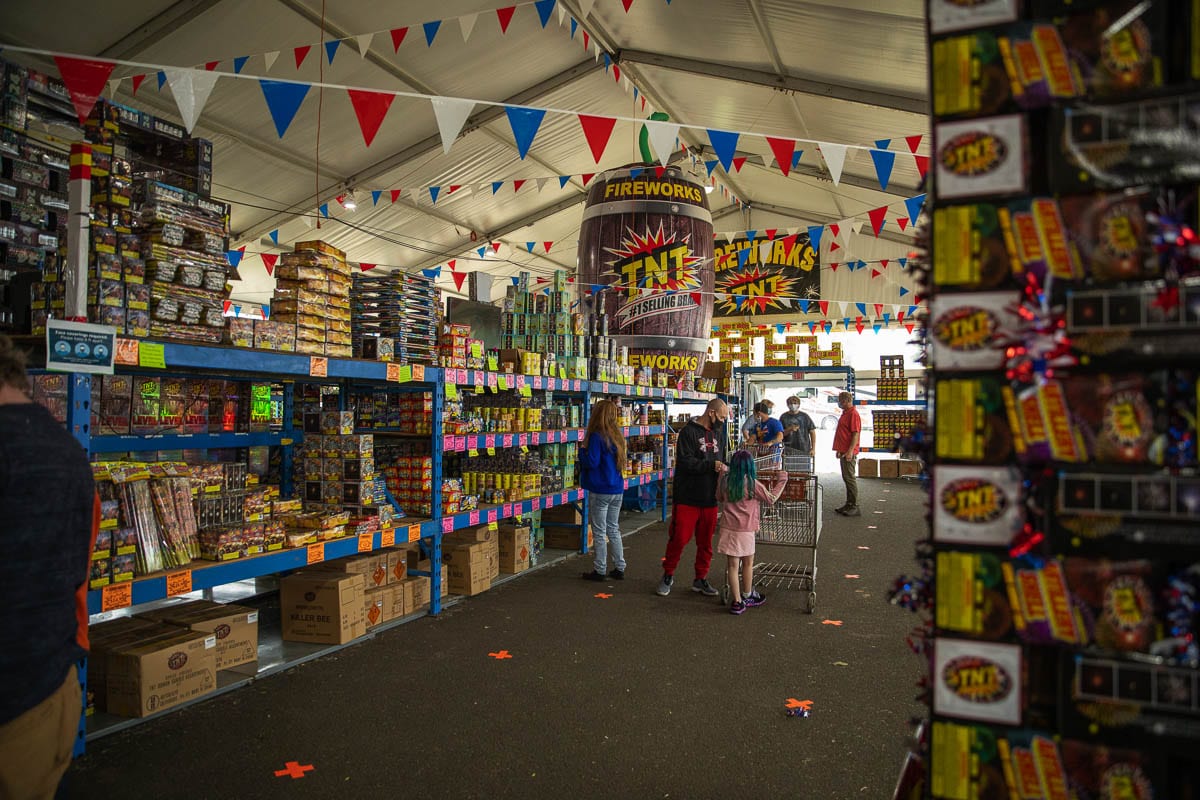A voter-backed referendum may put the issue in front of voters next November if enough signatures can be gathered
CLARK COUNTY — UPDATE FEB. 08, 2021: This article has been updated to contain a statement from the Chairman of the Cowlitz Tribe regarding their stance on the sale of fireworks in Clark County.
As expected, the Clark County Council voted 3-2 on Tuesday in favor of reversing an ordinance passed by the same margin in December limiting the use of fireworks in the county to those that don’t fly or travel along the ground.
Newly elected Councilor Karen Bowerman sided with Councilors Gary Medvigy and Eileen Quiring O’Brien on Monday, both of whom had voted against the rule change last year, though she did not speak publicly about the reasons for her decision.

All three also voted against a request by Councilor Julie Olson to delay the hearing until after an advisory vote could be put before the public in November.
“We could put a simple vote out to the community, whether it’s Safe and Sane, or we can work on the language,” said Olson. “But after that advisory vote, as a council, we could agree to adopt that as (an) ordinance.”
“The vote last December was an aberration and an abridgment of our democratic processes,” responded Medvigy. “So I understand the intent to try to delay, at all costs, this hearing today. I’m going to vote no (on the advisory vote).”
Shortly after the vote in December, a group of citizens began gathering signatures to put a referendum on the November ballot to reverse the ban.
Eric Rynne was one of the people gathering signatures, and said even veterans who suffered from PTSD and didn’t like the noise of the fireworks wanted to put it in front of voters.
“Their story was, you know, we want to give the people the chance to make a decision on something like this,” said Rynne. “I moved here from California where we weren’t able to celebrate our independence in the form that we are up here.”
Honey Burmel said she moved into the area from Oregon 15 years ago, and now returns there during the Fourth of July so her pets can escape the noise of her neighborhood.
“Our neighborhood has a number of neighbors that have 20 to 30 people at their house at a time, and did so again this year, even during the pandemic,” Burmel told the council. “And it was, again, like a war zone.”
While only a dozen or so people spoke publicly during Tuesday’s hearing, nearly 1,000 people had submitted written testimony. According to City Manager Kathleen Otto, approximately 56 percent supported the new Safe and Sane restrictions, while the rest wanted to overturn the ban.
Those who supported overturning the ban largely focused on the local economy, especially charities who raise a significant percentage of their revenue through the sale of fireworks. Others focused on their view that Independence Day is about freedom, and banning fireworks puts limits on them.
“For me, the fireworks going away as we know them will pretty much remove any real reason for me to have a get together,” said Robert Langley, “and to spend that time with the people that are dear to me, whether it’s family or close friends.”
Frank McKoy with Blackjack Fireworks, a Hazel Dell icon, said they worry fireworks restrictions would rob their employees of seasonal work, and open a door for the Cowlitz tribe to potentially sell fireworks on their tribal lands near ilani in Ridgefield.
“That Indian Reservation just up north wants to open up a 50,000-square-foot building,” said McKoy, “and they want to have all of the sales.”

State and local law does not apply to tribal reservations when it comes to the sale of fireworks, though Olson, whose district includes Ridgefield, said the Cowlitz tribe has publicly stated they have no interest in selling them.
In a statement to Clark County Today, Philip Harju, chairman of the Cowlitz Indian Tribe clarified that “We do not currently sell fireworks on Cowlitz Reservation land and have no plans to do so, regardless of changes to the Clark County fireworks restrictions.”
“If we make this change, I don’t think that all of our community citizens are going to break the law because they like fireworks that often,” said Olson, who also pointed out that recent data showed 50 percent of fireworks sold in the county go to Oregon, and only 11 of the 44 fireworks sales permits issued last year were for local companies.
Both Medvigy and Quiring O’Brien said they believe new restrictions on when fireworks can be sold and used in Clark County, which were approved in 2019 and took effect this past July, need more time for people to fully grasp.
“It takes time for people to learn what is legal, what is not legal, and what the new requirements and ordinance is,” said Quiring O’Brien before noting that, “two of the counselors that voted in favor of restricting these fireworks actually represent an area that, for the most part, have banned fireworks completely.”
That would refer to John Blom, who Bowerman replaced, and Temple Lentz, whose districts cover Vancouver, which has completely banned fireworks since 2016.
In her comments, Lentz noted that many of the people speaking out against fireworks referred to the mental and emotional trauma they cause, either to people or pets. Those supporting reversing the ban largely spoke of freedom and patriotism.
“I challenge that notion,” said Lentz. “It isn’t patriotism to terrorize your neighbors or recreate war zones. It isn’t patriotism to tell people who are harmed by the actions of others, that they should just suck it up. Patriotism is the love of country. And for me that extends to love of county, and love of neighbor.”
Olson, whose house caught fire in 2017 after a smoldering firework sparked bushes outside the home, said she understands that many people enjoy the noise and spectacle of the holiday.
“We can create public awareness around safety around these fireworks, but you cannot control these fireworks when they’re up in the air, you can’t control them where they land or whether they’re hot or on fire when they land,” she said Tuesday. “So when any of you out there who are pro fireworks have someone knocking on your door at 3:30 in the morning, because your house is on fire, you may have a different perspective of public awareness.”
Medvigy, who had previously said he opposed the December rules change because of a lack of sufficient public input during the pandemic, said Tuesday that he’s hopeful the new rules will prompt better behavior, and encouraged people to have more respect for their neighbors.
“We need education, we need to give the public more time,” he said. “And if it should get to another initiative or referendum process, that’s the people’s right. And I would heartily support that.”
Shortly after the vote, there were already comments online from some who planned to pursue a voter-backed initiative to put the regulations back on the ballot in November. Since the decision on Tuesday simply repeals the ordinance passed in December, the soonest any voter-approved rules changes could take effect would be December of 2022, and July of 2023.




